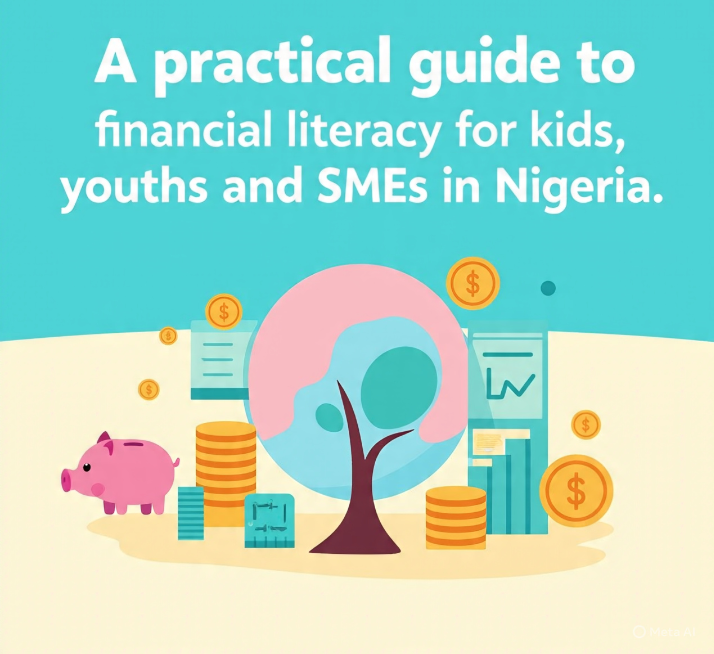💻 The Digital Office Skills Every Nigerian Needs to Succeed in Today’s Economy

From Local Hustle to Global-Ready Professional 💻
The Nigerian economic landscape is evolving faster than a Lagos bus driver changing lanes. With the rise of remote work and a global-first mindset, the traditional 9-to-5 is getting a major upgrade. But in this new digital office, your analog skills just won’t cut it.
The question isn’t whether you need digital skills to stay relevant; it’s which skills will truly make you stand out and thrive. This isn’t about becoming a tech guru overnight, but about mastering the tools that will transform your hustle into a high-impact career. Ready to future-proof your professional life? Read the content below.
📘 Table of Contents
1. Introduction
2. Why Digital Office Skills Matter for Financial Success
3. Module 1: Mastering Google Workspace
3.1 Google Docs: Crafting and Sharing Documents
3.2 Google Sheets: Your Online Financial Tracking Tool
3.3 Google Drive: Cloud Storage, Backup, and Sharing
4. Module 2: Essential Digital Communication
4.1 Gmail Setup & Etiquette
4.2 Video Conferencing Skills
4.3 Professional Messaging
5. Practical Application: Building Your Digital Profile
6. How to Monetise Your Digital Office Skills
7. Step by Step Guide to Becoming Digitally Fluent
8. Staying Updated and Competitive
9. Vital Resources and References
10. Disclaimer
🛒 Introduction
“In modern Nigeria, digital literacy is now inseparable from financial literacy.”
What are digital skills?
Digital skills are the abilities needed to use and interact with digital technologies, devices, and platforms effectively. They range from fundamental knowledge to highly specialized expertise and are essential for success in today’s professional landscape.
These skills can be categorized into different levels:
1. Foundational Digital Skills: These are the basic abilities required for everyday tasks.
* Computer and Device Literacy: Knowing how to operate a computer, smartphone, or tablet.
* Internet Navigation: Confidently using web browsers to search for information, access services, and navigate websites.
* Email Communication: Sending and receiving professional emails, managing an inbox, and using features like attachments and calendars.
* Online Safety and Privacy: Understanding how to protect personal data, recognize phishing scams, create strong passwords, and stay safe online.
2. Productivity Skills: These skills help you work efficiently and collaboratively in a digital environment.
* Office Software Proficiency: Expertise in word processors (e.g., Microsoft Word, Google Docs), spreadsheets (e.g., Excel, Google Sheets), and presentation software (e.g., PowerPoint, Google Slides).
* Cloud Storage and Collaboration: Using tools like Google Drive, Dropbox, or OneDrive to store, share, and collaborate on documents in real-time.
* Digital Communication and Collaboration Tools: Using platforms like Slack, Microsoft Teams, Zoom, or Trello for instant messaging, video conferencing, and project management.
3. Advanced and Specialized Digital Skills: These skills are often role-specific and highly in-demand in various industries.
* Digital Marketing: This includes a wide range of skills like Search Engine Optimization (SEO), social media marketing, content creation, email marketing, and data analytics.
* Data Analysis: The ability to collect, interpret, and use data to make informed decisions. This often involves using tools like Excel, Google Analytics, or more advanced platforms.
* Digital Content Creation: Creating and editing digital content such as graphics, videos, and professional documents using software like the Adobe Creative Suite or Canva.
* Web Development and Programming: A foundational understanding of coding languages like HTML, CSS, JavaScript, and Python.
* Cybersecurity: Knowledge of protecting networks, devices, and data from digital attacks.
* Digital Project Management: Using software and strategies to plan, execute, and monitor digital projects.
Whether you’re a student, job seeker, entrepreneur, or freelancer, your ability to navigate the digital office can determine your earning potential.
Employers expect it, clients demand it, and successful entrepreneurs rely on it.
This guide — adapted from the Digital Literacy and Career Development (DLCD) Workshop — will walk you through essential digital office skills and show you how to turn them into income opportunities.
💡 Why Digital Office Skills Matter for Financial Success
• Employability – Most jobs now require proficiency in digital tools.
• Entrepreneurship – Running a business efficiently means using cloud storage, spreadsheets, and online communication.
• Freelancing – Platforms like Upwork and Fiverr expect you to deliver work digitally.
• Financial Management – Tools like Google Sheets help you budget and track expenses.
• Remote Work – Global clients hire Nigerians with strong digital skills.
📂 Module 1: Mastering Google Workspace
3.1 Google Docs: Crafting and Sharing Documents
Purpose: Create, edit, and share text documents online.
Key Features:
• Real time collaboration
• Automatic saving to Google Drive
• Version history
• Templates for resumes, proposals, reports
• Sharing with view/comment/edit permissions
Practical Use: Drafting CVs, writing business proposals, creating training manuals.
3.2 Google Sheets: Your Online Financial Tracking Tool
Purpose: Organise, analyse, and visualise data.
Key Features:
• Formulas and functions for calculations
• Charts and graphs for insights
• Conditional formatting to highlight key data
• Data validation for accuracy
• Real time collaboration
Practical Use:
• Personal budgeting
• Business expense tracking
• Sales performance reports
3.3 Google Drive: Cloud Storage, Backup, and Sharing
Purpose: Securely store and share files.
Key Features:
• Centralised storage accessible anywhere
• Automatic backup
• Easy sharing with permission control
• Offline access
Practical Use:
• Storing contracts, invoices, and marketing materials
• Sharing large files with clients or team members
💬 Module 2: Essential Digital Communication
4.1 Gmail Setup & Etiquette
• Create a professional email address (avoid nicknames).
• Use clear subject lines.
• Keep emails concise and polite.
• Proofread before sending.
4.2 Video Conferencing Skills
• Platforms: Zoom, Google Meet.
• Test your camera, mic, and internet before meetings.
• Dress appropriately.
• Mute when not speaking.
4.3 Professional Messaging
• Use WhatsApp Business for client communication.
• Keep messages professional and to the point.
• Use broadcast lists for updates instead of spamming groups.
🛠 Practical Application: Building Your Digital Profile
1. Personal Profile Document – Highlight skills, experiences, and goals in Google Docs.
2. Curriculum Vitae (CV) – Professionally formatted for job applications.
3. Basic Budget Sheet – Track income and expenses in Google Sheets.
4. Portfolio Folder – Store all documents in Google Drive and share with potential employers or clients.
💵 How to Monetise Your Digital Office Skills
• Freelancing: Offer document creation, data entry, and spreadsheet services on Fiverr, Upwork, or Workana.
• Virtual Assistance: Manage emails, schedules, and files for busy professionals.
• Online Tutoring: Teach Google Workspace skills to students or small businesses.
• Business Support Services: Help SMEs digitise their operations.
• Content Creation: Use Docs and Sheets to plan and produce blog posts, reports, and e books.
Checkout this content on SIDE HUSTLE SAVINGS TURNING EXTRA INCOME INTO WEALTH. this article will expose you to how to beat Nigeria inflation and utilities every extra income earned from your side hustle. https://financialliteracy.com.ng/side-hustle-savings-turning-extra-income-into-wealth/
🧭 Step by Step Guide to Becoming Digitally Fluent
1. Learn the Basics – Start with Google Docs, Sheets, and Drive.
2. Practise Daily – Use them for personal tasks.
3. Take Online Courses – Platforms like Coursera, Udemy, and Google Skillshop.
4. Apply Skills Professionally – Volunteer or intern to gain experience.
5. Build a Portfolio – Showcase your work to attract clients or employers.
6. Market Yourself – Use LinkedIn and Facebook to promote your services.
🔄 Staying Updated and Competitive
• Follow tech blogs and YouTube channels.
• Join digital skills communities on Facebook and WhatsApp.
• Attend webinars and workshops.
• Experiment with new tools and features.
📚 Vital Resources and References
• Google Workspace Learning Center https://support.google.com/a/users/?hl=en
• Google Skillshop https://skillshop.withgoogle.com/
• Coursera – Digital Skills Courses https://www.coursera.org/courses?query=digital
• Udemy – Google Workspace Mastery
🛡 Disclaimer
financialliteracy.com.ng blog is only an educational enlightenment entity with aim to educate and equip Nigerians on prudent management of their resources and money.
We do not promote affiliate links or run investment portfolios.
Do your own research before investing as our contents are meant for educational purposes only.
What is financial literacy? Financial literacy is the possession of skills, knowledge, and behaviours that allow an individual to make informed decisions regarding money.
Frequently Asked Questions: On The Digital Office Skills Every Nigerian Needs
1. What are digital office skills?
Digital office skills are the technical and software-based abilities needed to work effectively in today’s modern workplace. They include proficiency in office applications, online communication tools, and digital collaboration platforms.
2. Why are digital office skills important for Nigerians?
With Nigeria’s growing digital economy, these skills improve employability, productivity, and competitiveness. Many employers now require candidates to demonstrate strong digital literacy.
3. What are the most essential digital office skills in Nigeria today?
The key skills include:
Microsoft Office Suite (Word, Excel, PowerPoint)
Email and online communication (Outlook, Gmail, Zoom, Teams)
Data management and cloud tools (Google Drive, OneDrive)
Basic digital marketing and social media management
Cybersecurity awareness
4. Do I need advanced computer knowledge to learn digital office skills?
No. Most digital office skills start with beginner-friendly tools. With regular practice and online tutorials, anyone can quickly build competence.
5. How can I learn digital office skills in Nigeria?
You can learn through:
Online courses (Coursera, Udemy, LinkedIn Learning)
Local training centers and IT institutes
Free tutorials on YouTube and Microsoft Learn
Hands-on practice with real projects
6. Are digital office skills required for all jobs?
Almost every profession now requires some digital competence, whether in reporting, communication, marketing, or record-keeping. Even non-IT roles often involve using office software and online collaboration tools.
7. How can digital office skills boost my career in Nigeria?
They increase employability, enable remote work opportunities, and help you qualify for higher-paying jobs, freelancing gigs, and even international roles.
8. Do Nigerian employers test digital office skills during recruitment?
Yes. Many companies include computer literacy tests — especially in Excel, Word, and email handling — as part of their hiring process.
9. What is the easiest digital skill to start with?
Microsoft Word or Google Docs is often the simplest starting point, followed by Excel and PowerPoint. These are widely used in Nigerian offices.
10. Can digital office skills help me work remotely?
Absolutely. Remote jobs require tools like Zoom, Slack, Google Workspace, and project management apps (Trello, Asana). Mastering these opens opportunities with Nigerian and international employers.

